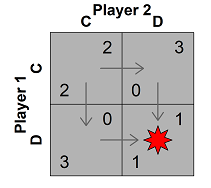game theory
Political Games presents forty-nine insights from game theory, illuminating the common logics underlying diverse political problems.
- text: segments available from Norton
- code: see the accompanying hop package for graphing and solving game (guide); see here for code for endnotes

Contents
Introduction: What Game Theory Is and Isn’t
Dilemmas of Collective Action
- The Tragedy of the Commons (The Prisoner’s Dilemma)
- Strategic Substitution (The Game of Chicken)
- Strategic Complementarities (The Assurance Dilemma)
Solutions to Social Dilemmas
- The Shadow of the Future (The Folk Theorems)
- Playing with Your Progeny (Overlapping Generations)
- Playing with the Wrong Goals (The Evolution of Preferences)
What Groups Want
- The Problem with Utilitarians (The Robbins Critique)
- Irrational Majorities (Condorcet’s Paradox)
- There Is No General Will (Arrow’s Theorem)
Majority Rule
- Majority Rule Aggregates Knowledge (Condorcet’s Jury Theorem)
- What’s Special about Simple Majority Rule? (May’s Theorem)
- Why the Middle Matters (The Median Voter Theorem)
- Voting Weight and Political Influence (Power Indices)
The Instability of Majority Rule
- You Can’t Satisfy All the Majorities Any of the Time (Plott’s Theorem)
- Naive Majorities are Capable of Anything (The McKelvey-Schofield Chaos Theorem)
- How Sticky are Sticky Rules? (Nakamura’s Theorem)
Manipulation
- Sophisticated Majorities Might Also Do Anything (Agenda Manipulation)
- Power from Proposing Prospers (Legislative Bargaining)
- It’s Hard to Get People to Vote Honestly (The Gibbard-Satterthwaite Theorem)
Strategic Voting
- Is It Rational to Vote? (The Rational Voter Paradox)
- Strategic Abstention (The Swing Voter’s Curse)
- Conformist Voting (Information Cascades)
Arguing
- Listening to Pain (Costly Signaling)
- When to Listen to Threats (Cheap Talk)
- Deep Democracy Among Strategists (The Limits of Deliberation)
- You Can’t Agree to Disagree (Aumann’s Agreement Theorem)
Bargaining
- The Bargaining Problem (The Nash Bargaining Solution)
- Alternating Offers (The Ståhl-Rubinstein Solution)
- The Benefits of Constraints (The Schelling Conjecture)
- Changing Fortunes Threaten Negotiations (The Commitment Problem)
Selling
- Let the Market Decide (The Coase Theorem)
- Auctions (The Revenue Equivalence Theorem)
- The Missing Market for Lemons (Asymmetric Information and Market Failure)
- The Impossibility of Informationally Efficient Markets (The Grossman-Stiglitz Paradox)
Institutional Design
- Solomon’s Dilemma (Maskin Monotonicity)
- How to Choose a Policy (The Clarke-Groves Mechanism)
- Not Getting to Yes (The Myerson-Satterthwaite Theorem)
Political Economy
- Throw the Rascals Out (The Logic of Political Accountability)
- Why More Inclusive Governments Produce More Public Goods (The Selectorate Model)
- Redistribution and Inequality (The Meltzer-Richard Model)
- Redistribution and Inefficiency (The Dixit-Londregan Model)
Revolting
- Small Is Beautiful (The Logic of Collective Action)
- Surprised by Revolt (Threshold Models)
- Dashed Expectations (Psychological Games)
- Feigning Tough (Reputation Models)
Limited Rationality
- Strategy without Strategizing (Evolutionary Stability)
- Adaptive Play and the Dominance of Fear (Stochastic Stability)
- Too Clever by Half (The k-level Model)
- The Irrationality of Others (A Theorem of Imitation)
Appendix A: Foundational Results in the Theory of Games A1. Reasoning Backward (Zermelo’s Theorem) A2. Solving Zero-Sum Games (The Minimax Theorem) A3. A Beautiful World? (Nash’s Theorem)